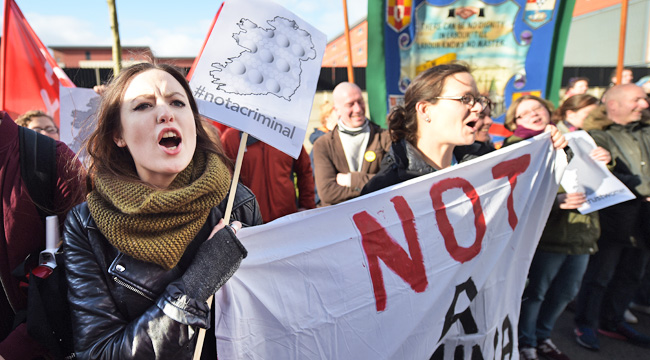
Ireland’s strict abortion laws only allow the procedure to be performed in cases where the woman’s life is in danger. In instances where a fetus is dying in the womb, abortions are prohibited, so a woman must travel overseas in order to terminate a pregnancy. This put Amanda Mellet — who was 21 weeks pregnant — in a precarious position, as a fetal abnormality meant that she would either give birth to a baby that was already dead, or the baby would die shortly after being born. To avoid these traumatic scenarios, Mellet was forced to travel (at her own expense) to another country where a legal abortion was possible.
Mellet flew to England and returned 12 hours after the procedure, since she couldn’t afford to extend the trip. And three weeks later, according to a UN report, the ashes of her fetus unexpectedly arrived on her front doorstep. Mellet approached the UN’s Human Rights Committee with her case after she was denied counseling or bereavement services (or any followup medical care) that are provided to women who miscarry.
Ireland, which is a State party to the International Covenant on Civil and Political Rights (ICCPR), is obliged to provide AM with an effective remedy, including adequate compensation and psychological treatment she may need, the Committee said. Ireland is also obliged to prevent similar violations from occurring.
“To this end, the State party should amend its law on voluntary termination of pregnancy, including if necessary its Constitution, to ensure compliance with the Covenant, including effective, timely and accessible procedures for pregnancy termination in Ireland, and take measures to ensure that health-care providers are in a position to supply full information on safe abortion services without fearing being subjected to criminal sanctions,” the Committee’s findings said.
The Guardian reports how pro-choice advocates in Ireland consider the compensation order “highly significant.” They hope that this decision by the UN will spur on a referendum to repeal the Irish constitutional amendment that grants citizen rights to embryos. In addition, the advocates believe that Mellet’s case acts as an example for Ireland to allow more abortion exceptions.
(Via Office of the United Nations High Commissioner for Human Rights & The Guardian)
